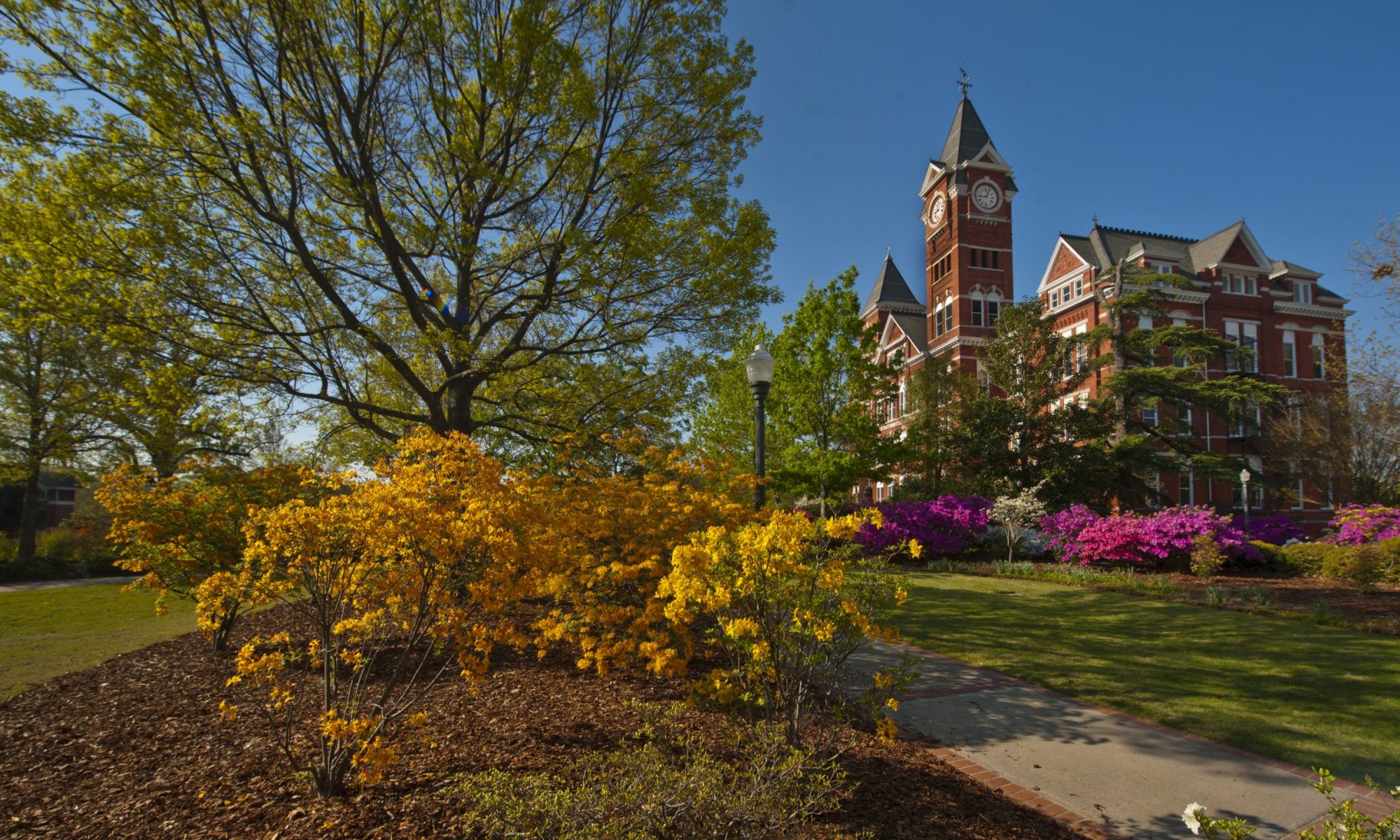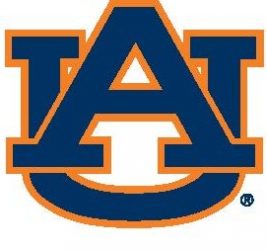By Kristen Bowman
Throw out everything you think you know about agriculture.
Because the nearly 20 different majors in the College of Agriculture at Auburn University could open doors to careers you cannot even imagine.
As agricultural scientists, our focus is on the food, fuel, water and natural resources that keep our world moving. We are working to make food safer, the environment cleaner and communities healthier. As one of the founding colleges of Auburn University, we tackle these goals through innovative research, academic rigor and outreach programs spanning around the world.
This is the work that makes the world work. Learn a little more about five of the majors our students are in below.
Johnathan Hampton – Horticulture
Does Johnathan Hampton look familiar? This rising senior horticulture major represents the College of Agriculture as an Ag Ambassador and is one reason why so many prospective students immediately feel welcome at the school. He’s passionate about landscape design and presenting a fuller understanding of what agriculture is.
In his pre-landscape architecture program, Hampton is gaining technical skills from across the discipline, including construction and soil science.
“One of the biggest things I enjoy is plant ID,” he said. “I’ve already taken one ID course called Small Trees, Shrubs and Vines. Having the knowledge of some of the plants already, I absolutely loved it. The course helps you connect the dots and realize, ‘Oh, I finally understand what that is.’”
Hampton chose to attend Auburn after touring a few schools with horticulture programs.
“The atmosphere and ambience of the town and the college really stuck out to me,” he said. “The College of Agriculture is one of the smaller colleges within Auburn and has more of a family feel. It seems like everyone knows and looks out for each other and is happy to be there. And it really shows how students are treated and invited in.”
Hampton encourages incoming students to get involved in clubs and activities in their college. In addition to Ag Ambassadors, he is a member of the Auburn University Landscape and Nursery Association. He said that traveling with the club to Mobile and attending the Gulf States Horticultural Exposition was a highlight of his college career so far.
“Basically, it’s an entire congregation of agriculture industry professionals,” he said. “You have masonry experts, plant wholesalers, people who specialize in annuals or perennials or breeding new cultivars. You also have leaders of horticulture organizations from around the country. So it was a huge deal to go and meet people and make connections.”
Kylie Weis – Applied Biotechnology
Weis has no doubt in her mind about why she chose Applied Biotechnology as her major at Auburn University: She wants to use the tools of nature to make nature better for mankind.
Biotechnologists use genetically modified organisms — commonly known as GMOs — to better utilize currently available resources. GMOs can help farmers by developing plants that are resistant to pests and pathogens or by engineering plants that are more tolerant to drought, for example.
These biotechnological advancements allow farmers to grow the amount of food needed to feed the world’s growing population, which serves as an inspiration to young biotechnologists like Weis.
“One of my biggest inspirations is a project called Golden Rice,” Weis said. “A lot of the world’s population survives on rice, and rice is not that nutritional, so people were beginning to suffer from vitamin A deficiency. But applied biotechnologists were able to modify rice to produce beta-carotene genetically.”
Beta-carotene is an essential nutrient that white rice lacks, which is converted into vitamin A in the body. The Golden Rice project is a symbol of an idea: that genetically engineered crops can help improve the lives of the poor.
Weis loves genetics and has been interested in a few different subject areas within the field since starting her major.
“If you want to go into applied biotechnology, try it even if you are just curious,” she said. “There are a lot of things that could catch your interest once you start getting into applied biotechnology.”
Adam Lenhard – Biological & Agricultural Technology Management

Biological and Agricultural Technology Management is a bit of a mouthful.
So it’s no wonder students in the program, like rising senior Adam Lenhard, call it BATMan.
Lenhard is one of a handful of students currently working in the newest piece of agricultural technology on Auburn’s campus: two vertical farms operating inside shipping containers.
“I have previously worked in an indoor, vertical hydroponic system in Huntsville, Alabama, and I have been itching to get back into that type of growing system,” Lenhard said. “These freights are providing me and other students on campus with the amazingly unique opportunity to work directly with some of the most advanced type of farming technology available today.”
The Freight Farms work by setting every environmental control — air, light, water and space — for optimal plant growth, all of which can be controlled from an app on your phone. With this technology, it is possible to continually grow food 365 days a year.
The food in the freights on Auburn’s campus will be harvested and served right back to students through Auburn’s Dining Services facilities.
Lenhard said he plans to continue to work with these types of indoor, LED hydroponic systems after graduation.
“I enjoy how these systems allow the user to completely manipulate all factors concerning plant growth and development through the proper mixture of nutrients, light and CO2,” he said. “I also believe that the high amount of water conservation that hydroponics provides can drastically help urban areas reduce their water usage while also providing consumers with fresh veggies harvested only a few miles from their apartments or homes.”
His goal after college is to normalize urban hydroponic farming; provide large, consistent yields of fresh vegetables; and provide food to those in need who do not have as much access to fresh produce.
“Having these freights directly on campus is providing me and my fellow classmates with a new and interesting learning experience that is advancing our hydroponic knowledge through hands-on experience,” he said. “I am absolutely stoked to have them here.”
Justin McCaghren – Crop, Soil & Environmental Sciences
Justin McCaghren grew up around agriculture.
That upbringing and his love of working outdoors led him to choose the major Crop, Soil and Environmental Sciences Production.
“I enjoy working with my hands,” he said. “And most importantly, I love hard work.”
McCaghren believes strongly in the idea that if you eat and you wear clothes, agriculture affects you. And he feels passionately that feeding and clothing the world in a way that helps to sustain the earth “is the greatest contribution or service that a person can give to society.”
The recent graduate from the College of Agriculture is continuing his education at Auburn to pursue a master’s in crop protection.
“I’m mainly focusing on weed science and crop injury,” he said. “Upon completion of a master’s, I plan to work for a chemical company until eventually I can start my own row crop and cattle farm.”
The biggest encouragement he can give to an incoming student would be to consider pursuing something they truly enjoy and that they will look forward to getting up each morning and doing.
“In the world of agriculture, there are unlimited opportunities and careers to choose from,” he said. “Specifically for my major, I would encourage an incoming student to think about whether they would like to pursue a career in helping to sustain life and the environment. If a student enjoys being hands on, working outside, and has a calling to serve their community and the world, then Crop, Soil and Environmental Sciences Production is definitely a major they should consider. After all, it is our work that makes the world work.”
Gracie Sims – Poultry Science
Gracie Sims credits her mother for getting her into poultry science.
“I was adamant about doing something in education until my mother took a job as an ag teacher while I was a freshman in high school,” she said.
Her mother was also an advisor for FFA, a student-led organization based in agriculture. So she signed her daughter up for a poultry judging competition.
“After getting over the initial opinion that this was a bizarre thing to compete in, I discovered I was good at it and competed for three years until I graduated high school,” Sims said. “Through this, I discovered Auburn has an excellent poultry department and became part of it in fall 2017.”
Sims graduated from the department this month and is starting in Auburn’s College of Veterinary Medicine this fall. After graduating from vet school, she hopes to return to the poultry industry as a poultry veterinarian.
“I am aware poultry science is not the first major that comes to mind when thinking about college majors,” she said. “But during my time as a poultry science student, I have learned the ins and outs of a multibillion-dollar industry that aims to produce poultry meat and eggs for the growing population.”
Coupling this with what she calls “the absolute best undergrad experience,” Sims says to look no further if you wish to be a part of “something bigger.”
“Providing food is the ultimate basic need,” she said. “And in the words of the College of Agriculture, ‘this is the work that makes the world work.’”

